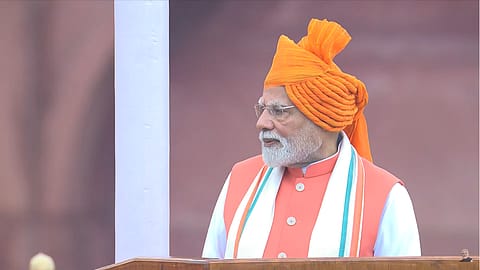PM Modi gives a clarion call for Atmanirbhar Bharat amid tariff disruptions
PM Modi linked self-reliance to national security and economic growth, urging innovation in technology and energy. He announced initiatives in semiconductors, clean energy, and space, aiming for a developed India by 2047.

Amid the disruptions that the U.S. tariffs are expected to cause, Prime Minister Narendra Modi has called for Atmanirbharta (self-reliance) in a Naya Bharat. Delivering the 79th Independence Day address from the Red Fort on Friday, PM Modi linked the country’s national security, technology, energy, and economic future to the idea of a self-reliant India.
“An Atmanirbhar Bharat is the base for a developed Bharat, dependence on other [nations] is full of pitfalls. One needs to remain cautious to remain Atmanirbhar (self-reliant). The concept of Atmanirbharta is not only limited to imports, exports, rupees and dollars, it is related to capability,” said PM Modi.
Against a backdrop of global trade disruptions and tariff wars, he underscored that dependence on other nations is “fraught with pitfalls” and that India’s capabilities must drive its growth.
Modi started his speech by paying homage to freedom fighters and architects of the Constitution. He then highlighted Operation Sindoor as proof of the country’s defence preparedness. He said that for India, indigenous capability will remain a central point in its security strategy. The country would not tolerate terror or nuclear blackmail, he added, and was committed to giving a fitting response to any aggression.
“India has set a new normal. India will treat terrorists and terror supporters as one and the same. India will not tolerate nuclear blackmail. India will give a befitting reply to any attack in the future,” he said.
He covered every sector and the efforts taken by the Centre to boost self-reliance in that industry, be it innovation in AI and deep tech or self-sufficiency in energy and EVs.
PM Modi positioned technology and self-reliance as the twin pillars of India’s journey to a Viksit Bharat @ 2047. He pointed to past delays in India’s semiconductor ambitions but announced that six projects are now underway, with the first Made-in-India chips expected by the year-end.
Recommended Stories
“I don't want to criticise previous governments. But India launched a semiconductor pilot project about 50-60 years back. The youth will be surprised to know that files related to India's semiconductor plan got stuck. Many nations have now established semiconductor supremacy. We have taken up semiconductor projects on mission mode,” said PM Modi.
Energy security was marked out as a priority, with plans to increase nuclear capacity tenfold by 2047, expand clean energy, and launch deep-water exploration and a national critical minerals mission.
The space sector, with 300 startups already active, is expected to see India working towards its own space station, he added. He pressed for indigenous jet engines, AI, deep tech, EV batteries, fertilisers, and social media platforms, urging youth and private enterprise to drive innovation.
PM Modi said it is unfortunate that India has to depend on imports for fertilisers. "Private sector needs to find new ways to manufacture indigenous fertiliser as per our needs," he said.
(INR CR)
On the economy, Modi stressed that macro indicators remain strong, with controlled inflation and robust forex reserves offering stability amid global turbulence. A neo-middle class is emerging, aided by reforms and schemes such as zero tax on income up to ₹12 lakh, the rollout of a ₹1 lakh crore youth fund, and support for women entrepreneurs through the “Lakhpati Didi” initiative. He also announced the launch of the Pradhan Mantri Viksit Bharat Rozgar Yojana to support 3 crore youth.
Modi signalled further reforms, with a task force to review GST and promises of next-generation changes by Diwali, including tax cuts on common-use goods. He closed with a message that every moment till 2047 must be used to build a developed Bharat, powered by self-reliance, innovation and entrepreneurship.
“India is developing a modern ecosystem across sectors to become a developed economy by 2047. Why should India's wealth go outside? Entrepreneurship has come up as a huge strength in the last 11 years, as it has powered innovation. We have decided to set up a task force for next-generation reforms, [as it is the] need of the hour to review GST [norms],” said PM Modi.